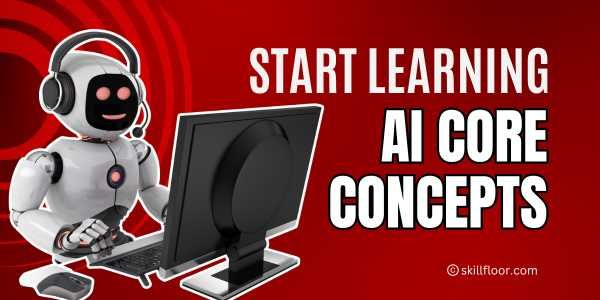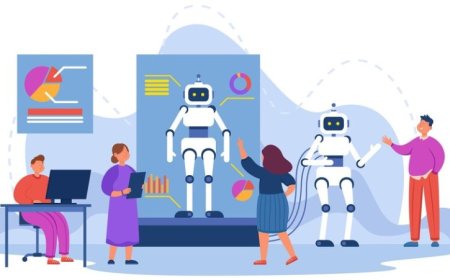Understanding the Core of AI Basic Concepts
Learn the basics of Artificial Intelligence (AI), its types, key branches, applications, and impact on industries. Understand how AI transforms daily life and work.

Have you ever wondered how the brightest brains produce items that greatly simplify life? What's even better is that you don't have to be an expert to comprehend them. The fundamentals are easy for anybody to understand and may be used to improve daily tasks.
Have you ever noticed how your automobile provides timely notifications to keep you safe or how your favorite applications recommend things you'll enjoy next? Your day is easily improved by these tools, which seem like dependable friends. These intelligent systems, which have been developed by professionals and supported by years of study and testing, are made to consistently improve convenience, security, and customization in daily life.
You may trust that smart tools are made to assist you even if you are not a tech expert. They are made easy and practical by companies like Apple and Google. With their practical recommendations, these tools simplify your life rather than take the place of your judgment.
What Is Artificial Intelligence (AI)?
AI is the capacity of machines to simulate human-like problem-solving and decision-making. To do activities more effectively, it enables gadgets like smartphones, applications, and smart devices to learn from experiences. These developments make life easier and enhance everyday chores.
Taking "Artificial Intelligence Courses" to learn "AI basic concepts" might help you understand how this technology drives devices like voice assistants and suggestions. Learning the fundamentals will help you understand how technology affects our environment and improves our everyday interactions with it.
Why is Artificial Intelligence (AI) Important Today?
Artificial Intelligence is changing how we use technology, live, and work. AI has been created by experts to address a variety of challenging issues, ranging from automating repetitive chores to enhancing healthcare results. Its wide-ranging potential is shown by its applications in sectors including banking, transportation, and education.
Consider how your phone makes word suggestions while you type or how your navigation app saves time with real-time traffic reports. You may easily make your day better with these clever tools. Reputable businesses and researchers make sure these inventions are dependable, improving ease and efficiency in daily life and assisting with anything from early health detection to customer service.
The purpose of smart technologies is to supplement human judgment, not to take its place. Reputable businesses like Google and Microsoft make great efforts in creating these technologies to make sure they are secure, dependable, and easy to use. These developments contribute to a more connected, effective society that meaningfully empowers individuals by increasing accessibility and daily comfort.
The Different Types of Artificial Intelligence
1. Narrow Intelligence (Weak AI)
This kind focuses on certain duties, such as making movie recommendations, answering inquiries, or forecasting the weather. Although it does a good job at these duties, it is limited to one area of functioning and is unable to adapt or act beyond its designed goal.
2. General Intelligence (Strong AI)
Systems with general intelligence can understand and solve issues similarly to humans while adjusting to new challenges. This idea, while still theoretical, seeks to build robots that can reason and adapt to a range of real-world problems.
3. Superintelligence
Superintelligence is the theory that robots are more intelligent than humans in every way, including creativity and problem-solving. Although this high degree of capacity is still far off, it is an intriguing subject that is frequently explored in study and fiction.
Key Branches of Artificial Intelligence
1. Machine Learning
Teaching systems to learn from data and adjust over time is known as machine learning. Gaining an understanding of "AI basic concepts" here clarifies how ongoing learning enhances forecasts and decision-making.
2. Natural Language Processing (NLP)
NLP makes it possible for technologies to organically comprehend and react to human language. By studying "AI basic concepts," you may investigate how language translation software and chatbots complement human conversation.
3. Computer Vision
Computer vision is the study of visual data interpretation, such as picture analysis and face recognition. Understanding "AI basic concepts" enables you to grasp how visual activities are automated in sectors such as healthcare and security respectively.

4. Robotics
Robotics creates devices that can do tasks on their own by fusing intelligence with mechanical systems. Understanding "AI basic concepts" explains their expanding importance in physical surroundings, from industrial automation to rescue operations.
5. Predictive Analytics
Predictive analytics helps firms make decisions by using patterns in data to estimate future events. Gaining knowledge of "AI basic concepts" enables you to comprehend how forecasts efficiently influence marketing, healthcare, and other industries.
6. Deep Learning
Neural networks are used in deep learning to handle challenging tasks like image analysis and speech recognition. Its basis in "AI basic concepts" demonstrates how it simulates the way the human brain works to solve problems.
Difference between AI and human intelligence
|
Aspect |
Human Intelligence |
Artificial Intelligence |
|
Learning |
Humans learn through experience, emotions, and instincts, adapting to different situations creatively. |
Systems learn from data and patterns but lack emotions or instinct-driven learning. |
|
Decision-Making |
Decisions are influenced by logic, emotions, and moral values, balancing creativity and reasoning. |
Decisions are purely data-driven, following programmed logic without moral context. |
|
Adaptability |
Humans can adapt to unpredictable changes and handle new tasks flexibly without prior training. |
Systems perform well with defined tasks but struggle with unfamiliar situations. |
|
Creativity |
Creativity is natural for humans, driven by imagination, emotions, and unique experiences. |
Systems can mimic creativity but lack originality or genuine inspiration. |
|
Problem-Solving |
Humans solve problems with critical thinking, intuition, and past experiences. |
Systems rely on algorithms and data patterns to solve problems systematically. |
|
Emotions |
Emotions are an integral part of human intelligence, influencing decisions and social interactions. |
Systems do not have emotions and cannot understand or replicate human feelings. |
How Artificial Intelligence Works
The AI Workflow
-
Problem Identification: Choosing a specific issue to address, such anticipating client preferences or automating processes, is the first step. An explicit objective guarantees that the proper strategy is used successfully.
-
Data Collection: Obtaining high-quality data is essential to building intelligent systems. This stage entails locating pertinent data, such as pictures, text, or numbers, in order to train and improve solutions.
-
Data Preparation: Cleaning and arranging raw data are frequently necessary to make it usable. This stage ensures accuracy for the following steps of the process by eliminating mistakes, filling in gaps, and structuring data.
-
Model Development: With the help of the processed data, an appropriate model is developed and trained. This approach gains knowledge about patterns and behaviors that aid in prediction-making and problem-solving.
-
Testing and Validation: Unseen data is used to test the generated model to make sure it functions properly. Validation guarantees its precision, dependability, and capacity to manage practical circumstances.
-
Deployment and Monitoring: Putting the answer into practice in practical applications is the last phase. It may be updated or improved over time with continuous monitoring, which guarantees that it operates as planned.
Key Components of AI Systems
-
Data Input: All systems start with data, whether it is numbers, text, or pictures. For precise, dependable solutions that successfully handle certain tasks, the caliber and volume of this input are essential.
-
Knowledge Representation: This entails organizing data in ways that a system can comprehend. The system may link bits of information to make logical decisions and get insights by using knowledge graphs or rules.
-
Inference Engine: An inference engine makes predictions or draws conclusions by using information and rules. It simulates thinking by evaluating inputs and producing useful results. Many systems rely on Artificial Intelligence Algorithms to ensure accurate and reliable inferences.
-
Optimization Algorithms: Algorithms like this improve performance on solutions. They let systems improve and adapt over time, leading to more intelligent and effective judgments.
-
Feedback Loops: Systems may learn from their mistakes and accomplishments thanks to feedback mechanisms. The system improves over time by honing its behavior through result analysis.
-
Human-AI Interaction: Communication between systems and users must be smooth. With intuitive interfaces, people can engage with computers with ease, entering data and getting results that are easy to grasp.
How AI is Transforming Industries and Our Daily Lives
1. Healthcare Innovation
Smart technologies let physicians make diagnoses more quickly, which improves patient care. Being familiar with "AI basic concepts" improves our comprehension of how technology promotes improved health outcomes.
2. Smarter Transportation
Travel is being revolutionized by navigation applications and driverless automobiles, which provide safer, quicker, and more effective options for long-distance and daily commutes.
3. Personalized Shopping
By learning about your behaviors and providing tailored recommendations, online retailers make shopping easier and more pleasurable by offering product recommendations based on your interests.
4. Enhanced Education
Interactive learning resources provide lessons that are tailored to each user's needs. "Artificial Intelligence Courses" can illustrate the "ai basic concepts" that underpin these developments.
5. Financial Solutions
Technology makes it easier to manage investments, identify fraud, and streamline banking, enabling both people and organizations to make more secure and convenient financial decisions.
6. Improved Entertainment
Streaming services make personalized movie and television show recommendations, which improves leisure and enjoyment by providing you with stuff you'll enjoy without having to search endlessly.
Challenges and Ethical Considerations in Artificial Intelligence
1. Data Privacy
Privacy issues are brought up by the usage of personal information. Trust must be maintained and sensitive data must be shielded from abuse or breaches by striking a balance between innovation and user privacy.
2. Bias in Decision-Making
Biases in the data that AI systems are trained on may inadvertently be reflected in the systems, producing biased results. To address this, a variety of datasets and extensive fairness testing are needed.
3. Job Displacement
Some employment may be replaced by automation, posing economic concerns. As new possibilities arise, it's critical to assist employees in moving into positions that call for human skill and innovation.
4. Lack of Transparency
As "black boxes," certain systems make choices for which there are no obvious justifications. Maintaining openness, particularly in crucial applications, fosters user confidence and understanding of decision-making processes.
5. Accountability and Regulation
Determining who is accountable for mistakes is a difficult task. Ensuring that systems are utilized responsibly and for the benefit of the public requires the development of explicit legislation and ethical standards.
The Future of Artificial Intelligence
The fields of healthcare, education, and transportation are all being impacted by the fast-changing nature of artificial intelligence (AI). Comprehending "AI basic concepts" is crucial to appreciating its significance. Personalized learning, early illness diagnosis, and effective transportation systems are all anticipated as AI develops. By being knowledgeable about "AI basic concepts," we may better navigate and participate in this technological revolution.
For more insights, explore these resources:
Artificial intelligence keeps changing how we live and engage with the world, creating chances for more intelligent solutions in a variety of sectors. Its influence is felt in daily life, from improved healthcare and education to more individualized experiences. Knowing the "AI basic concepts" enables us to decide how these technologies might help society and ourselves. By mastering "AI basic concepts," we may confidently embrace this rapidly developing technology and realize its potential to solve problems and enhance people's lives. A better, more connected future for everybody will be ensured by ethical concerns and responsible use as we investigate its potential.






























































